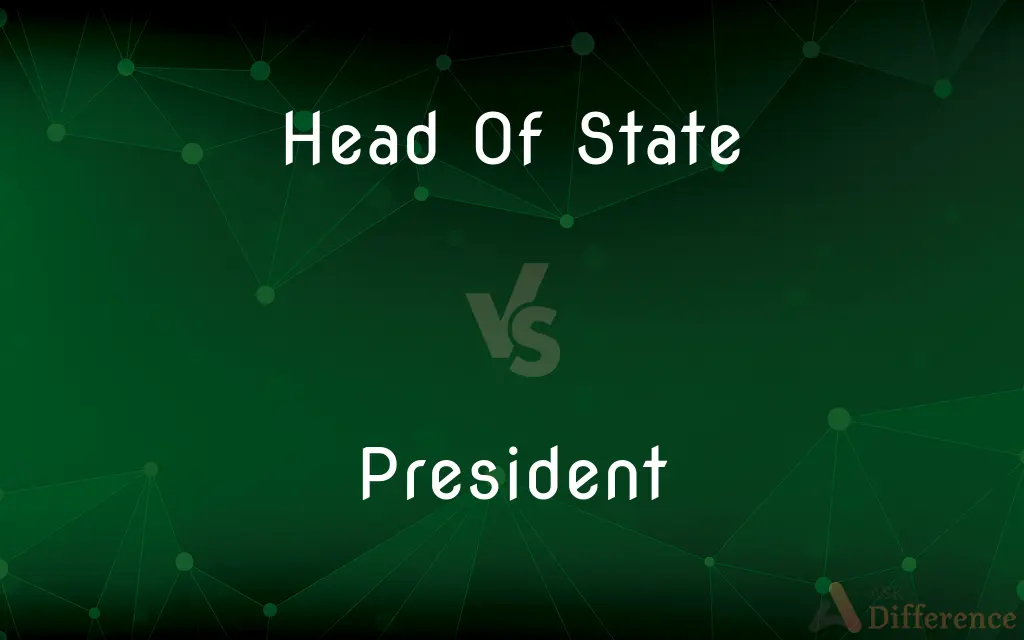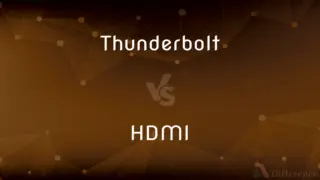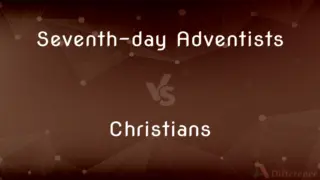Head Of State vs. President — What's the Difference?
By Maham Liaqat & Urooj Arif — Published on March 6, 2024
The head of state embodies a country's national identity and may have ceremonial duties, while a president is often the head of state and/or government, with executive powers in a republic.

Difference Between Head Of State and President
Table of Contents
ADVERTISEMENT
Key Differences
The term "head of state" refers to the individual who represents the unity and legitimacy of a state, embodying its continuity and national identity. This role, varying by country, can be largely ceremonial or hold significant powers. For example, in constitutional monarchies, the monarch is the head of state, whereas, in many republics, the president fulfills this role alongside or exclusively of being the head of government.
Presidents, particularly in republics, often serve as both the head of state and the head of government, combining ceremonial duties with substantial executive powers. This dual role encompasses leading the executive branch, making policy decisions, and representing the nation both domestically and internationally. In contrast, in systems where the roles are separate, the president might strictly manage government operations, leaving symbolic and unifying functions to a monarch or ceremonial head of state.
The distinction between these roles influences the political structure and governance of a country. In nations where the president is not the head of state, such as in parliamentary or semi-presidential systems, the prime minister or chancellor typically leads the government, focusing on policy and administration, with the head of state taking on a more symbolic position.
Election or appointment processes for heads of state and presidents vary, reflecting each country's unique political traditions. Presidents in republics are often elected either directly by the people or through an electoral college, while heads of state in monarchies inherit their position. The method of selection underscores the nature of each role, with elected presidents usually accountable to the electorate and hereditary heads of state symbolizing historical continuity.
The influence and authority of a head of state compared to a president depend on constitutional arrangements and political customs. In some countries, the head of state's role is strictly ceremonial, with no influence on daily governance, whereas in others, especially where the president is also the head of state, the position wields significant power over national and international affairs.
ADVERTISEMENT
Comparison Chart
Role
Symbolizes national unity and identity.
Often combines roles of head of state and government.
Powers
Ceremonial to substantial, depending on the country.
Typically holds executive powers in a republic.
Example Positions
Monarch, president.
President of a republic, sometimes prime minister.
Responsibilities
Representing the state, ceremonial duties.
Policy-making, leading the government, international representation.
Selection
Hereditary or appointed in monarchies, elected in republics.
Elected directly or through an electoral college in republics.
Compare with Definitions
Head Of State
Can be a monarch, president, or other designated official.
In Germany, the Federal President is the head of state with primarily ceremonial roles.
President
Often the head of state and government in a republic.
The President of the United States holds both ceremonial and executive powers.
Head Of State
The symbolic representative of a country's unity and continuity.
Queen Elizabeth II served as the head of state for the United Kingdom.
President
Represents the nation in diplomatic matters and international relations.
The South Korean President engages in global summits and diplomatic negotiations.
Head Of State
May have ceremonial or significant powers, varying by country.
The Japanese Emperor performs ceremonial duties as head of state.
President
Responsible for leading the executive branch and policy implementation.
The Brazilian President directs national policy and administration.
Head Of State
In many republics, coincides with the role of the president.
The French President serves as both head of state and head of government.
President
Elected directly by the people or through an electoral college.
The Russian President is elected through a national vote.
Head Of State
Represents the nation at official events and international affairs.
The Canadian Governor General attends state functions as the head of state.
President
May share or hold distinct powers from the head of government, depending on the system.
In France, the President has extensive powers compared to the Prime Minister.
President
One appointed or elected to preside over an organized body of people, such as an assembly or meeting.
President
The chief executive of a republic.
President
The chief executive officer of the United States, with powers as determined by the US Constitution.
President
The chief officer of a branch of government, corporation, board of trustees, university, or similar body.
President
The head of state of a republic.
The vast majority of presidents have been male.
President
A person presiding over a meeting; a chair, presiding officer, presider.
President
To act as president; to do presidential duties.
President
One who is elected or appointed to preside; a presiding officer, as of a legislative body.
President
Occupying the first rank or chief place; having the highest authority; presiding.
His angels presidentIn every province.
President
An executive officer of a firm or corporation
President
The person who holds the office of head of state of the United States government;
The President likes to jog every morning
Common Curiosities
What are the main responsibilities of a head of state?
Main responsibilities include representing the state at official and ceremonial functions, ensuring the continuity of governance, and, in some systems, playing a role in foreign affairs and national defense.
What is the difference between a head of state and a president?
The head of state symbolizes national unity and may have ceremonial or significant powers, while a president typically has executive powers and may also serve as head of state in a republic.
Can a country have both a president and a head of state?
Yes, in some political systems, the roles of president and head of state are separate, with the president often leading the government and the head of state having a more symbolic role.
Is the Queen of England a head of state?
Yes, the Queen (or King) of England is the head of state in the United Kingdom, performing ceremonial duties and representing national unity.
How is a head of state chosen?
Heads of state are either hereditary (in monarchies), appointed, or elected, depending on the country's system.
What happens if a president is also the head of state?
When a president is also the head of state, they typically hold a combination of ceremonial duties and substantial executive powers, overseeing the government's functioning and representing the nation in all matters, both domestically and internationally.
Can a head of state be removed from office?
The process for removing a head of state varies by country and can be complex, often requiring legal proceedings or a legislative vote. In monarchies, removal is rare and complicated due to the hereditary nature of the position, while in republics, impeachment or resignation might be possible for presidents under specific circumstances.
Does a president always have more power than a head of state?
Not necessarily. The president's powers depend on whether they also serve as head of state and on the country's constitution. In some cases, the head of state may have substantial powers, especially in monarchies or special executive systems.
What role does a head of state play in a crisis?
In a crisis, a head of state may play a unifying role, offering reassurance and stability to the nation, and, depending on their powers, might also be involved in decision-making or in coordinating with government officials to address the crisis effectively.
How does a president differ in a parliamentary system?
In a parliamentary system, the president (if the role exists separately from the head of state) may have limited powers, with the prime minister acting as the head of government and leading policy and administration.
Can a head of state also be involved in government policy-making?
This varies by country; in some systems, the head of state has a ceremonial role with no direct involvement in policy-making, while in others, they may have significant influence or even direct control over certain policies.
How do presidential powers vary in different countries?
Presidential powers can vary widely depending on the country's constitution and legal framework. In some nations, the president has extensive control over the government, while in others, their role is more ceremonial or constrained, with significant powers vested in the parliament or a prime minister.
How does the election process for a president differ from other officials?
The election process for a president often involves a nationwide vote, which can be direct or through an electoral college, distinguishing it from the election of other officials, who may be elected by local constituencies or appointed based on party positions.
Are there countries where the head of state has no real power?
Yes, in many constitutional monarchies and some republics, the head of state's role is largely ceremonial, with little to no direct involvement in daily governance or policy-making, serving more as a symbol of unity and continuity.
What is the significance of a head of state in international relations?
A head of state, especially in their role as a symbol of the nation, plays a crucial role in international relations, engaging in diplomacy, signing treaties, and representing their country at global events, thereby influencing international perceptions and relationships.
Share Your Discovery

Previous Comparison
Thunderbolt vs. HDMI
Next Comparison
Seventh-day Adventists vs. ChristiansAuthor Spotlight
Written by
Maham LiaqatCo-written by
Urooj ArifUrooj is a skilled content writer at Ask Difference, known for her exceptional ability to simplify complex topics into engaging and informative content. With a passion for research and a flair for clear, concise writing, she consistently delivers articles that resonate with our diverse audience.
















































